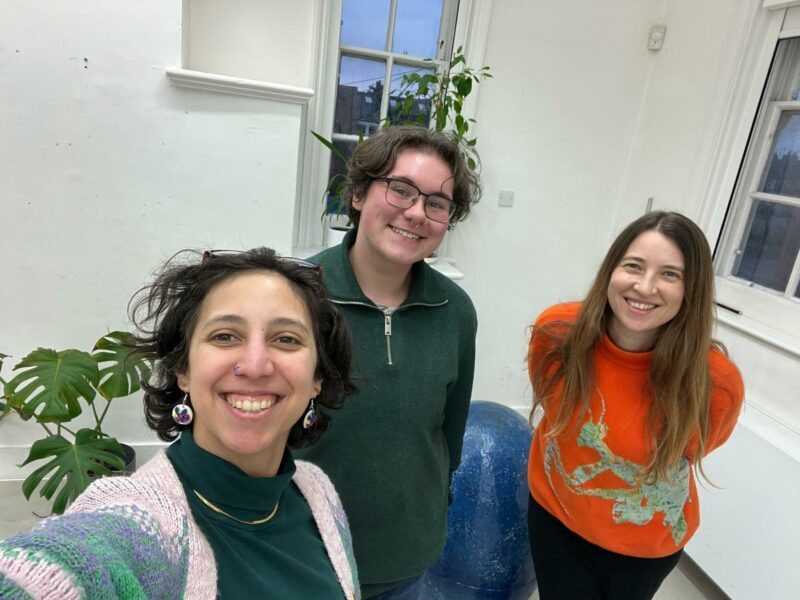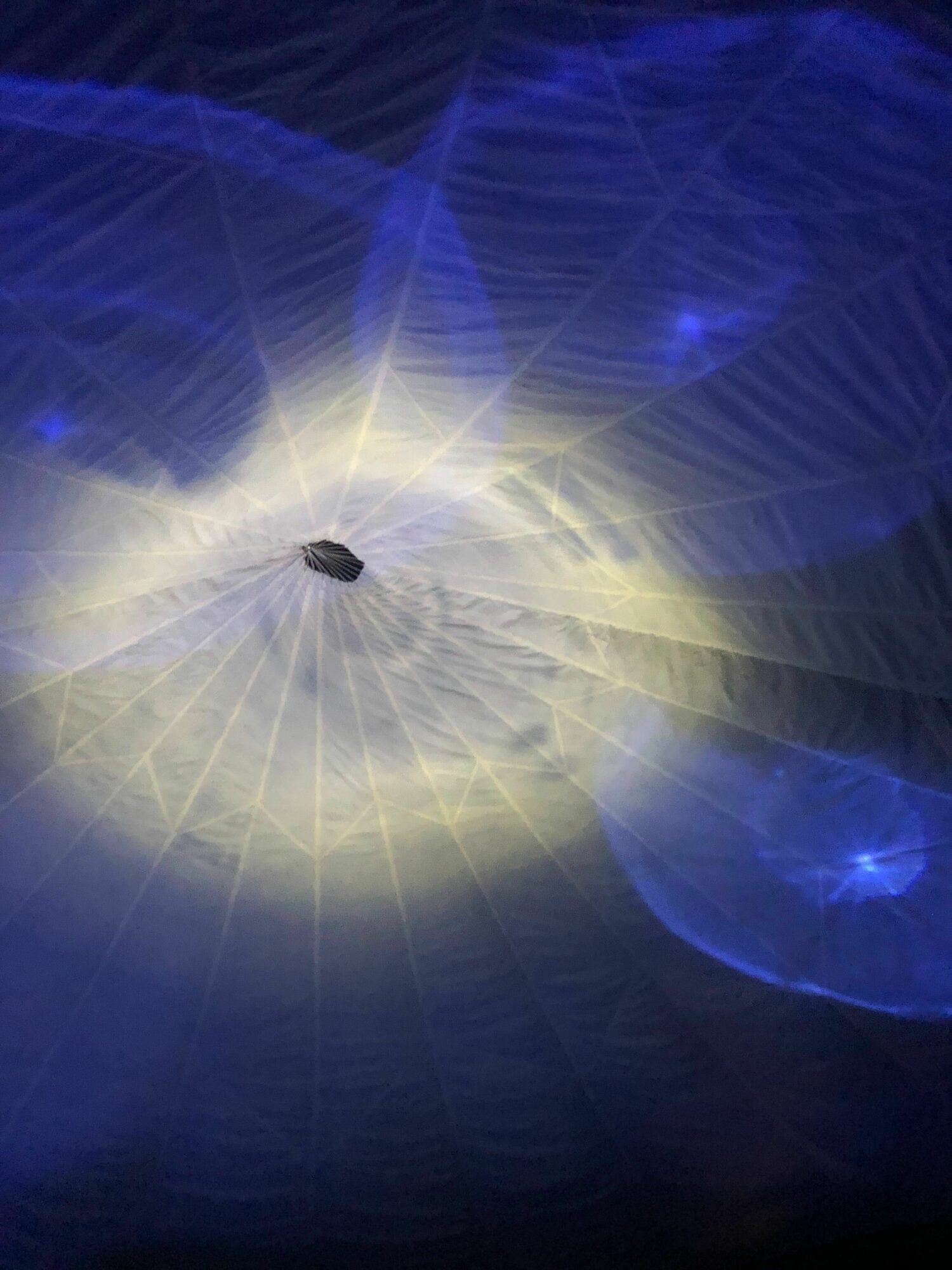My Placement with Oily Cart: A Journey into Sensory Theatre

About Me
My name is Billie Antimony, (@billie_antimony) I’m a performance artist, facilitator, producer, and student currently pursuing my BA(Hons) in Theatre and Social Change from Rose Bruford College. My art explores themes of neurodiversity and disability, often with queer identity. I aim to create art that represents minoritised groups and amplifies marginalised voices, with a focus on how these identities can intersect. I’m passionate about making theatre more inclusive and accessible, I believe in the power of performance to ignite social change.
My journey with Sensory Theatre began when I worked with Ella McGran, a previous Oily Cart placement student, on her dissertation project. Through Ella, I was introduced to the transformative world of Sensory Theatre and Oily Cart’s groundbreaking work. This experience sparked my interest in the field and ultimately led me to apply to pursue my final year producing placement with Oily Cart—a dream come true and an incredible opportunity to deepen my understanding of this incredible, unique art form. I also gained a deeper understanding of how Oily Cart prioritises access, develops audiences, and situates themselves as pioneers of the industry. Their innovative approach to Sensory Theatre—creating immersive, multi-sensory experiences for audiences with the most barriers to access—felt like the perfect environment to grow as a producer and artist, and gain invaluable industry experience.
Gaining Industry Experience
Stepping into Oily Cart’s world was like entering a creative playground. From day one, I was completely immersed in the practicalities of running a theatre company that prioritises inclusivity and accessibility. I got to see how a small but mighty team collaborates to bring their visionary ideas to life, and talk with individuals about how their particular role fits into the system. Whether it was observing how they adapted their processes to meet the needs of their audiences, actors, and staff, or learning about the logistics of touring sensory performances, every moment was a lesson in how to make theatre truly accessible.
A Crash Course in Sensory Theatre
Beyond the practical experience in the office and rehearsal room, my placement also gave me a crash course in the theory behind Sensory Theatre, with oodles of resources to read though, videos to watch, and interviews to dissect. I learned about the importance of sensory integration, the role of neurodiversity in audience engagement, and how to design performances that are inclusive from the ground up. Being able to talk with inspiring artists such as Rhiannon Armstrong and Ellie Griffiths was truly an honour, the opportunity to witness their creative process live was an education and a half. These insights have not only deepened my understanding of Sensory Theatre but have also influenced how I approach my own work as an artist.
Experiencing Sensory Theatre Firsthand
One of the highlights of my placement was experiencing Sensory Theatre in action. Oily Cart’s work is deeply rooted in creating intimate, personalised experiences for their audiences. I had the chance to observe how they use sound, lighting, touch, smell, and movement to engage audiences in ways that traditional theatre often overlooks. It was inspiring to see how much thought and care goes into every detail, from the textures of the props to the pacing of the performance.
Observing Rehearsals for When the World Turns

A particular highlight of my placement was observing rehearsals for Oily Cart’s new tour, When the World Turns. This production is a beautiful exploration of the ecosystem we are all a part of, designed for young audiences with the most barriers to access. Watching the creative team work was like witnessing magic in the making. The way they experimented with sensory elements—like the sound of rain on our paper shelters, or the feeling of a shoe-brush-snake as it wiggles across arms—was both artistic and deeply care-centred. It was fascinating to see how they embodied creativity and playfulness to create an experience that would resonate with their audience.
Having the chance to sit in as an audience member during dress rehearsals was an experience I will never forget, and it has inspired me to pursue creative positions within Sensory Theatre. I was bought into a world where the only thing that mattered was my unapologetic, radical joy in this sensory moment. I was able to stim, tic and verbalise as I needed, something that I am not all that used to. My favourite moment was watching the lights dancing on the top of the tent, as it reflected off the water I was moving with my own hands.
Being a Disabled Artist: Unmasking in a Professional Space
As a disabled artist, I’ve often felt pressure to mask or downplay my disability in professional settings. But at Oily Cart, I felt seen and valued for who I am. The team’s commitment to accessibility and inclusion isn’t just limited to their audiences—it extends to their artists and staff as well. Hearing members of the creative and producing team talk openly about their own access needs was incredibly healing. This environment allowed me to unmask and fully embrace my identity as a disabled creative. It was a powerful reminder that my disability isn’t something to be hidden, but something valued that brings unique perspective that can enrich the creative process. Me and my disability have intrinsic value at Oily Cart. I may have started in November a nervous wreck, but by February I was sitting with my collection of fidgets and headphones typing away without any fear of judgement.
Final Thoughts
My lived experiences, and degree in Theatre and Social Change, have shaped how I view the role of art in society: it is a vital part of telling the story of those who many think have no voice. My time with Oily Cart reinforced the importance of this mission. Seeing how they centre their audiences—most of whom are neurodivergent and / or disabled —in every aspect of their process was incredibly affirming. It reminded me that theatre can be a powerful tool for social change, especially when it prioritises inclusivity and representation.
My time with Oily Cart was more than just a placement—it was a transformative experience. I walked away with a deeper appreciation for the power of Sensory Theatre, a stronger sense of confidence in my identity as a disabled artist, and a wealth of knowledge that I’ll carry with me throughout my career.
If you’re an artist or theatremaker looking to expand your horizons, I can’t recommend Oily Cart enough. Their work is a testament to the fact that theatre can—and should—be for everyone.
